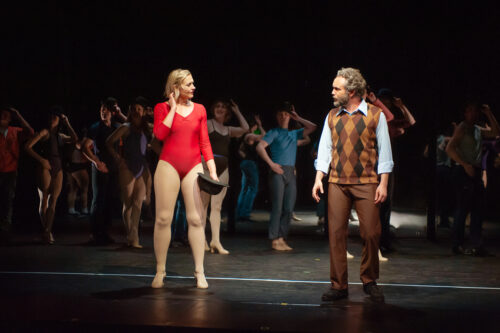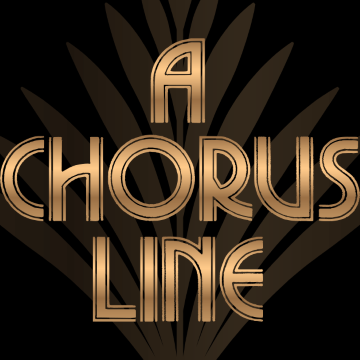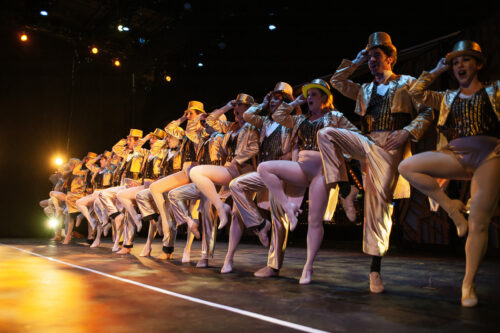THE MUSICAL WITH LEGS
San Francisco Playhouse‘s exuberant, high-kicking production of A Chorus Line proves that the musical is as fresh as the day it appeared almost fifty years ago, when the standard Broadway musical was already fading away, making room for the jukebox musicals and mostly hollow spectacles we are still forced to endure.
The ensemble
The miracle of A Chorus Line, which opened last night, June 28, is that it is a very simple tale, but encompasses themes which resonate with universality. The simple plot: On a bare stage, a director not only puts auditioning dancers through the usual grueling repetitive combos, but interviews them as well. A side story involves the director and his ex, a leading lady who needs work so badly she is willing to return to the chorus. For those who haven’t seen it, believe it or not, that’s the entire story.
Diana Morales (Samantha Rose Cárdenas) and dancers
Yet as these distinctive performers begin to open up about their lives and how they became dancers, themes of growing up, dysfunctional families, careers, and, yes, what they do for love, begins to mirror all of our lives, not just those who stretch before literal mirrors (Heather Kenyon‘s set, co-designed by director Bill English, has hand-maneuvered three-sided castered columns with mirrors on one side). Like us, those auditioning cover the gamut of race, religion, and creed. Whether gay, old (well, for a dancer at 40), Puerto Rican, privileged, Asian, short, flat-chested, or scared, everyone is unsure of the future. An all-too-American quality, at least at this stage of post-COVID inflationary times, is the desperation (“I really need this job”) that surges through “God, I Hope I Get It.”
Richie (Chachi Delgado), (back) Greg (Dalton Bertolone) and Connie (Ruri Kodama)
With a gigantic cast such as this that requires triple-threat dancer/singer/actors, you’d think there would be more misses than hits (after some auditioning dancers are cut at the top, there are 17 dancers, the dance captain and the director). Surprisingly, there are a slew of fully-realized characters on stage, and enough terrific movement to inspire you to rush out and join dance class. English‘s pile-driving revival will win your heart. If you bring your younger brood (not too young now), this will be the show which hypnotizes them into a love for the arts, especially due to the ensemble song, “Hello Twelve,” which musicalizes the pain, joy, angst and embarrassment of adolescence better than any other musical number has to date.
Greg (Dalton Bertolone) and cast
In the “Hello Twelve” medley, the dynamic and emotional Samantha Rose Cárdenas (Diane) — who later belts out the tough-girl wisdom of “What I Did for Love” — nails the nullification of a negligible acting class in “Nothing,” and Chachi Delgado is thrilling as Richie, whose teenage enthusiasm is thwarted by adult fear in “Gimme the Ball.” Man, can that cat move! For being Jewish and gay, laid-back Greg (a hilariously understated Dalton Bertolone) tells us how he easily got an erection from minor things, like a bus!
Maggie (Danielle Cheiken), Sheila (Alison Ewing), Bebe (Jillian A. Smith)
As Sheila, the aging but indomitable siren, Alison Ewing purges her past in “At the Ballet,” joined by a heartbreaking strong-singing Danielle Cheiken as Maggie, and the clearly pretty Jillian A. Smith as Bebe, who actually comes off as “plain” as she tells us she is. English’s gorgeous staging is equaled by the ladies’ exquisite harmonies. And while the musical is firmly set in 1975, you’ll notice a few larger-bodied women. While that may have been taboo in 1975, I went to Broadway recently and some of the most memorable chorus girls were indeed bigger, so I applaud that inclusion here.
Val (Melissa WolfKlain), (back) Kristine (Gwen Tessman), Paul (Alex Rodriguez), Diana Morales (Samantha Rose Cárdenas)
Melissa WolfKlain delights as she details Val’s surgical saga in “Dance: Ten; Looks: Three”; Maggie Connard is perfect for Judy, the tall girl with two left feet when not dancing and an awkward sense of humor; and Gwen Tessman conjures images of old-time comediennes with a blend of endearing goofiness and realism as Kristine, who, per her own admission, just can’t “Sing!” (M. Javi Harnly as Kristine’s sympathetic Italian husband Al is goofily distinctive with a skinny frame and soft voice).
Mark (Zeke Edmonds), (back) Val (Melissa WolfKlain), Diana Morales (Samantha Rose Cárdenas)
Also notable: Nicholas Yenson successfully blends sarcasm with acerbic sincerity as the scarf-wearing Bobby, a self-aware, self-deprecating man who survived a rigid upper-class background; true triple-threat Tony Conaty — a standout — plays Mike, an assertive but adorable Bronx-ite who discovered tap very early on (and tells us about it in “I Can Do That”); and Zeke Edmonds, who has the sweetest pipes, is truly funny as Mark, the youngest dancer in the group, who recalls the time he diagnosed his own appendicitis and then misdiagnosed a wet-dream as gonorrhea.
Ruri Kodama as Connie, (back) Tony Conaty, Dalton Bertolone, Nicole Helfer, Alison Ewing, Nicholas Yenson
Alex Rodriguez wisely plays down the heartbreaking story of Paul, who endured his uneasy adolescence by joining a transvestite burlesque in Harlem (this is one of the juiciest monologues in the history of musicals). Keith Pinto is perfectly cast as the domineering director, Zach; Pinto, who can still dance up a storm, played Zach as ragged and a bit tired; even though Zach isn’t looking for work, his own vanity and aging issues come to play when he wonders why dancers even do what they do. As Zach’s dance captain and assistant Lori, Ann Warque goes for eye-rolling impatience, a choice that works and one which I’ve never seen before.
Paul (center - Alex Rodriguez) with Cast
A wonderful actress and singer, Nicole Helfer has some of that spark and star power necessary for us believe Cassie has what it takes to be a headliner above all the other gypsies. Through no fault of Helfer, her solo dance and song, “The Music and the Mirror,” is just too long with uninteresting, repetitive choreography and feels a bit leaden. I was hoping this would be the Chorus Line to change that, but the productions I’ve seen hew too close to Bennett’s original choreography, which was specifically for soon-to-be ex-wife Donna McKechnie. Aside from that, Helfer as choreographer recreates Bennett and Bob Avian’s original choreography stupendously well.
 Cassie (Nicole Helfer) and her ex, director Zach (Keith Pinto)
Cassie (Nicole Helfer) and her ex, director Zach (Keith Pinto)
James Kirkwood and Nicholas Dante’s book (which is far too salty for the younger kids) holds up remarkably well, as do the songs of Marvin Hamlisch (music) and Edward Kleban (lyrics). As with many revivals, the costumes (Abra Berman) and movement mimic Michael Bennett’s original version, and I wouldn’t have it any other way: It’s a tribute to that great pre-AIDS era before theater became more an entertainment conglomerate than an art form (both Dante and Bennett succumbed to the disease).
The Ensemble
It’s ironic that, after we get to know the eight “dance gypsies” chosen from the twenty-four who endure this grueling try-out, the survivors get swallowed up in “One,” a massive finale where the thing that counts is the lockstep anonymity of a kick line. The humanity that went into the song and monologue confessionals — during which auditioners testify to the resilience, sexiness, escapism and transience of their trade — yields to the conformity of interchangeable parts. This “one singular sensation” is American individuality feeding American efficiency. It’s an oh-so necessary ending that makes a statement and has you dancing out of the theater — if you haven’t already floated out.
A Chorus Line
San Francisco Playhouse, 450 Post Street in San Francisco
Tues-Thurs at 7; Fri at 8; Sat at 3 & 8; Sun at 2 & 7
ends September 9, 2023 EXTENDED to September 16, 2023
for tickets ($15-$100), call 415.677.9596 or visit SF Playhouse

